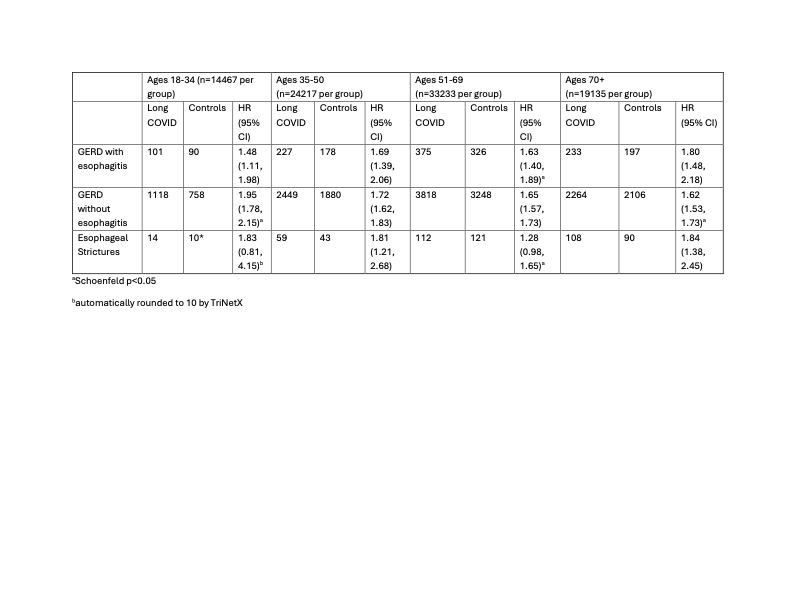Sunday Poster Session
Category: Esophagus
P0677 - Long COVID Is Associated With an Increased Risk of Developing GERD and Related Complications
Sunday, October 26, 2025
3:30 PM - 7:00 PM PDT
Location: Exhibit Hall

Batsheva Rubin, MD, MPH
MetroHealth Medical Center
Cleveland, OH
Presenting Author(s)
Batsheva Rubin, MD, MPH1, Benjamin Liu, MD2, Yan Sun, MD2, Gengqing Song, MD, PhD3
1MetroHealth Medical Center, Cleveland, OH; 2Case Western Reserve University / MetroHealth, Cleveland, OH; 3Case Western Reserve University/Metro Health, Cleveland, OH
Introduction: Long COVID is a chronic condition resulting from SARS-CoV-2 infection. While most associated with respiratory conditions, gastrointestinal symptoms including reflux occur in almost one third of patients six months following COVID-19 infection. Our study aimed to evaluate whether Long COVID increases the risk of gastroesophageal reflux disease (GERD) subtypes, including erosive esophagitis (EE) and non-erosive reflux disease (NERD) and complications like esophageal strictures.
Methods: This retrospective cohort study utilized the TriNetX US database to assess the risk of developing GERD and its complications among patients diagnosed with Long COVID versus matched controls without Long COVID. Patients with prior GERD, systemic sclerosis, or prior esophageal/gastric surgery were excluded. Cohorts included patients diagnosed after October 2021 (post-establishment of the Long COVID ICD code). Analyses involved 1:1 propensity-score matching, stratified into four age groups: 18–34, 35–50, 51–69, and ≥70 years. Outcomes were assessed using Cox-proportional hazard ratio (HR) analyses, examining the risks of EE, NERD, and esophageal strictures.
Results: Long COVID significantly increased risks for GERD subtypes and related complications across all age groups, with the highest risk for EE and esophageal strictures observed in patients aged ≥70 years. Specifically, among the youngest cohort (18-34 years, n=14,467 each), Long COVID patients exhibited a higher risk of EE (HR 1.48; 95% CI 1.11-1.98). In the 35-50 year group (n=24,217 each), elevated risks were seen for EE (HR 1.69; 95% CI 1.39-2.06), NERD (HR 1.72; 95% CI 1.62-1.83), and esophageal strictures (HR 1.81; 95% CI 1.21-2.68). For the 51-69 year group (n=33,233 each), there was a significantly increased risk of NERD (HR 1.65; 95% CI 1.57-1.73). The oldest cohort (≥70 years, n=19,135 each) showed heightened risks for EE (HR 1.80; 95% CI 1.48-2.18) and esophageal strictures (HR 1.84; 95% CI 1.38-2.45).
Discussion: Long COVID is associated with increased risk of developing GERD (NERD and EE) and esophageal strictures. While potentially attributable to inflammation and dysbiosis, future research is needed to further elucidate the mechanisms of this relationship. Further research should investigate underlying pathophysiological mechanisms and potential long-term consequences such as Barrett’s esophagus and esophageal adenocarcinoma.

Figure: Stratified cox proportional hazard models HR (95% CI) for the association between Long COVID and GERD subtypes and complications
Disclosures:
Batsheva Rubin indicated no relevant financial relationships.
Benjamin Liu indicated no relevant financial relationships.
Yan Sun indicated no relevant financial relationships.
Gengqing Song indicated no relevant financial relationships.
Batsheva Rubin, MD, MPH1, Benjamin Liu, MD2, Yan Sun, MD2, Gengqing Song, MD, PhD3. P0677 - Long COVID Is Associated With an Increased Risk of Developing GERD and Related Complications, ACG 2025 Annual Scientific Meeting Abstracts. Phoenix, AZ: American College of Gastroenterology.
1MetroHealth Medical Center, Cleveland, OH; 2Case Western Reserve University / MetroHealth, Cleveland, OH; 3Case Western Reserve University/Metro Health, Cleveland, OH
Introduction: Long COVID is a chronic condition resulting from SARS-CoV-2 infection. While most associated with respiratory conditions, gastrointestinal symptoms including reflux occur in almost one third of patients six months following COVID-19 infection. Our study aimed to evaluate whether Long COVID increases the risk of gastroesophageal reflux disease (GERD) subtypes, including erosive esophagitis (EE) and non-erosive reflux disease (NERD) and complications like esophageal strictures.
Methods: This retrospective cohort study utilized the TriNetX US database to assess the risk of developing GERD and its complications among patients diagnosed with Long COVID versus matched controls without Long COVID. Patients with prior GERD, systemic sclerosis, or prior esophageal/gastric surgery were excluded. Cohorts included patients diagnosed after October 2021 (post-establishment of the Long COVID ICD code). Analyses involved 1:1 propensity-score matching, stratified into four age groups: 18–34, 35–50, 51–69, and ≥70 years. Outcomes were assessed using Cox-proportional hazard ratio (HR) analyses, examining the risks of EE, NERD, and esophageal strictures.
Results: Long COVID significantly increased risks for GERD subtypes and related complications across all age groups, with the highest risk for EE and esophageal strictures observed in patients aged ≥70 years. Specifically, among the youngest cohort (18-34 years, n=14,467 each), Long COVID patients exhibited a higher risk of EE (HR 1.48; 95% CI 1.11-1.98). In the 35-50 year group (n=24,217 each), elevated risks were seen for EE (HR 1.69; 95% CI 1.39-2.06), NERD (HR 1.72; 95% CI 1.62-1.83), and esophageal strictures (HR 1.81; 95% CI 1.21-2.68). For the 51-69 year group (n=33,233 each), there was a significantly increased risk of NERD (HR 1.65; 95% CI 1.57-1.73). The oldest cohort (≥70 years, n=19,135 each) showed heightened risks for EE (HR 1.80; 95% CI 1.48-2.18) and esophageal strictures (HR 1.84; 95% CI 1.38-2.45).
Discussion: Long COVID is associated with increased risk of developing GERD (NERD and EE) and esophageal strictures. While potentially attributable to inflammation and dysbiosis, future research is needed to further elucidate the mechanisms of this relationship. Further research should investigate underlying pathophysiological mechanisms and potential long-term consequences such as Barrett’s esophagus and esophageal adenocarcinoma.

Figure: Stratified cox proportional hazard models HR (95% CI) for the association between Long COVID and GERD subtypes and complications
Disclosures:
Batsheva Rubin indicated no relevant financial relationships.
Benjamin Liu indicated no relevant financial relationships.
Yan Sun indicated no relevant financial relationships.
Gengqing Song indicated no relevant financial relationships.
Batsheva Rubin, MD, MPH1, Benjamin Liu, MD2, Yan Sun, MD2, Gengqing Song, MD, PhD3. P0677 - Long COVID Is Associated With an Increased Risk of Developing GERD and Related Complications, ACG 2025 Annual Scientific Meeting Abstracts. Phoenix, AZ: American College of Gastroenterology.
